URI club sailing team members Kevin Stamp ’22 (left) and incoming captain Luke Ingalls ’21 on Point Judith Pond last fall.
By Grace Kelly
When you think about sports at URI, you might think first about varsity sports like basketball, football, or track and field. But look again, and you’ll find a group of dedicated, competitive club athletes. URI’s club sports teams have earned national championships, a world title, and have even spawned Olympians.
The some-540 students of URI’s club sports programs are not only competitive—practicing six days a week, sometimes seven—they also run the show: They hire coaches, manage club finances, book and host tournaments, and coordinate transportation. Some teams—like hockey and field hockey—have tryouts. Some, like sailing, don’t have tryouts, but expect participants to have experience. And many—like crew and rugby—accept anyone and everyone.” If there is a pertinent use for the term “level playing field,” this is it.
Club sports are an often-misunderstood niche within college sports. They receive about thirty percent of their funding from student fees. The rest of their operating expenses come from fundraising (much of that from alumni) and membership dues, which can vary greatly from team to team. But don’t make the mistake of thinking these athletes are “just” club athletes. Like varsity athletes, they train hard, compete against other schools, and vie for national championships.
These are their stories.
Club crew members get in an early morning workout in the fog on Narrow River last fall.
Crew: The Commitment
It’s 6 a.m. at the URI Boathouse, and all is dark. A groggy crew of novices gather in the boat bay, hands clenched in sweater sleeves. It’s too windy to go out on the water today, but that doesn’t mean the crew has the day off.
Instead, coaching staff lead a grueling two-hour session of rowing machine and bodyweight exercises. They keep the pace in what sounds like an aerobics class from hell: “Three, two, one, switch!” he bellows, as rowers strip off their shirts and change places, hopping on and off the ergometer. Steam rises from their shoulders.
This is URI club crew. But you might be surprised it’s “just” a club sport.
There’s a lot to live up to. Banners and awards are scattered throughout the boathouse. Listen to the speech—no, the monologue—Coach Edward Slater makes on this blustery Thursday morning:
“Starting tomorrow, if you’re not here, you’re not on this team. Period,” Slater says. “You have a choice. Show up tomorrow and you’re on the team. If you don’t, I wish you well.” He raises his voice. “This is not a team of desperation. This team requires being here and supporting each other. Those who’ve come before you for fifty-three years haven’t handed out participation awards. They’ve gone after national championships. And our goals are championships! Our first result is getting here and getting jacked up to the goddamn eyeballs!” he shouts. “Is that clear?!” A murmur goes through the group. “I gotta hear you!” he yells.
“YES!” the rowers reply.
“All right, good. Make your choice today. I’ll see this team tomorrow.”
URI crew is a commitment, and with a rich and spectacularly successful history, it’s easy to see why.
Established in 1966, the team launched itself onto Worden’s Pond with two donated rowing shells, a leaky skiff, and a young assistant math professor, Ralph Kopperman, for a coach. Fast forward, and the club has produced national championship winners and an Olympic medalist: Jason Gailes ’92, who won a silver medal in the men’s quad at the 1996 Olympics in Atlanta.
“Rowing is the ultimate team sport,” says Jeff Sweenor ’86. “It requires extreme individual effort, but if you’re not coordinated with everyone else in the boat, you actually make the boat slower.”
Sweenor is president of the Friends of URI Crew and owner of a successful building company in Wakefield, Rhode Island. He started rowing as a lifeguard, hauling a dory through the waves. As a college student, he worked out at the same gym as the coach of the crew at the time. “He found out I went to URI and said, ‘Hey, would you be interested in rowing?’” says Sweenor. “I said, ‘Sure.’ I made the varsity boat my freshman year; my sophomore year, we won a national championship.”
Years later, he realized what crew really did for him.
“My rowing experience taught me that how you do anything is how you do everything,” says Sweenor, who helped rebuild the boathouse when it burned down in 1992. “I’ve built my company by hiring people who share that perspective.”
A URI equestrian team rider and his horse take a quiet lap last fall at Hunter Ridge barn in Ashaway, Rhode Island.
Equestrian: The Bond
It’s a cold, bright, fall morning, and Hunter Ridge Barn in Ashaway, Rhode Island—about 30 minutes from URI’s Kingston Campus—is humming with life. A group of dogs runs around playing as horses peek out of stalls, curious about the rowdy canines.
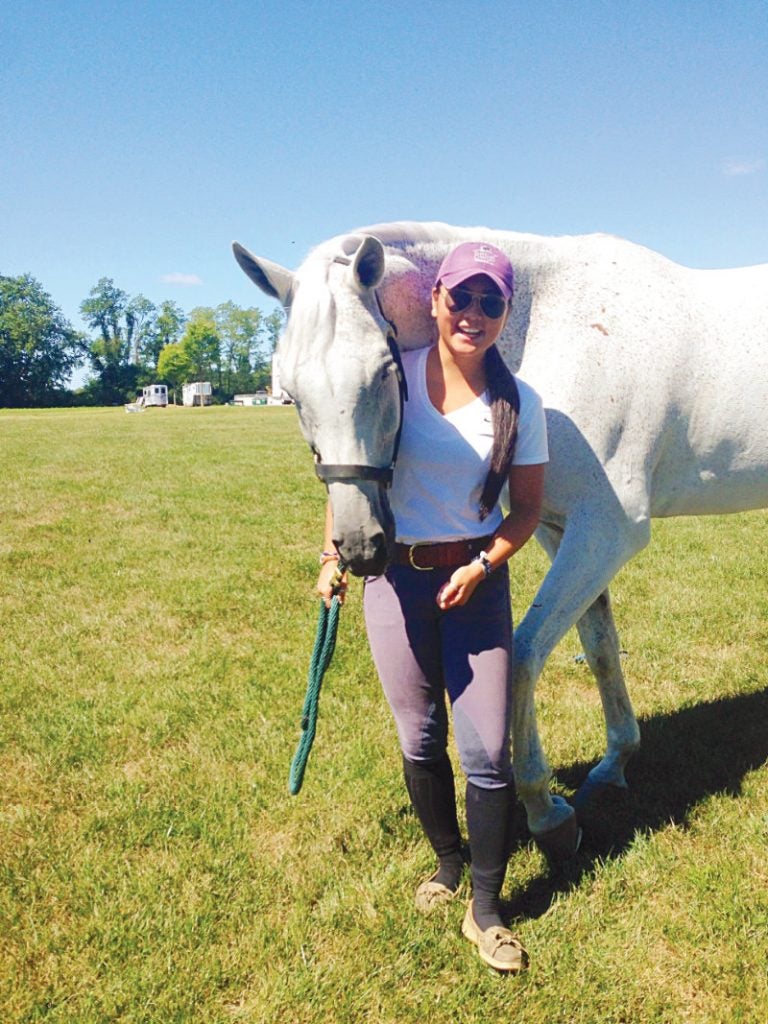
“It’s nice having the dogs run up to you when you get here,” says Jessica Peterson ’20, president of the equestrian club. “It’s like a therapy-dog session!”
The power is out after a blustery night, but Peterson’s enthusiasm can’t be dampened. She gushes about the equestrian team as a group of riders trot, canter, and post around the indoor ring, kicking up dust that swirls in the early morning sunlight.
“This is Bianca,” she says as she offers her palm to a white horse. “She’s an upper-level horse. It’s funny, because even though she definitely has a little sass to her, she loves walk-trotters.” Walk-trotters are beginner riders, which the team happily accepts. “At our shows, she’ll be a little sassy and spunky for our upper-open riders (the highest division), but you put a walk-trotter on her, and she has her little ears forward, head down, nice and relaxed.”
The equestrian team is unlike other teams in that the bond is not only human-to-human, but also human-to-equine.
“Horses are responsive to the rider’s energy; if you’re nervous and tense, they feel that and respond to your mood,” says Peterson.
Working closely with the horses fosters a sense of respect and responsibility for the animals’ well-being.
“We take a lot of pride in the health of our horses, and Wendy, our coach, has always said that the horses’ health needs to come first,” Peterson says. “That’s something we really ingrain in the new riders, because the horses are the ones doing eight-hour days of lessons for us. They’re working so hard, we should do everything we can to keep them in good shape.”
Sailing: The Legacy
Eighty years. A lifetime. Almost a century.
That’s how long URI students have navigated the waters of Point Judith Pond as a part of the club sailing team. Their legacy is strong and full of champions, but they had a scrappy beginning.
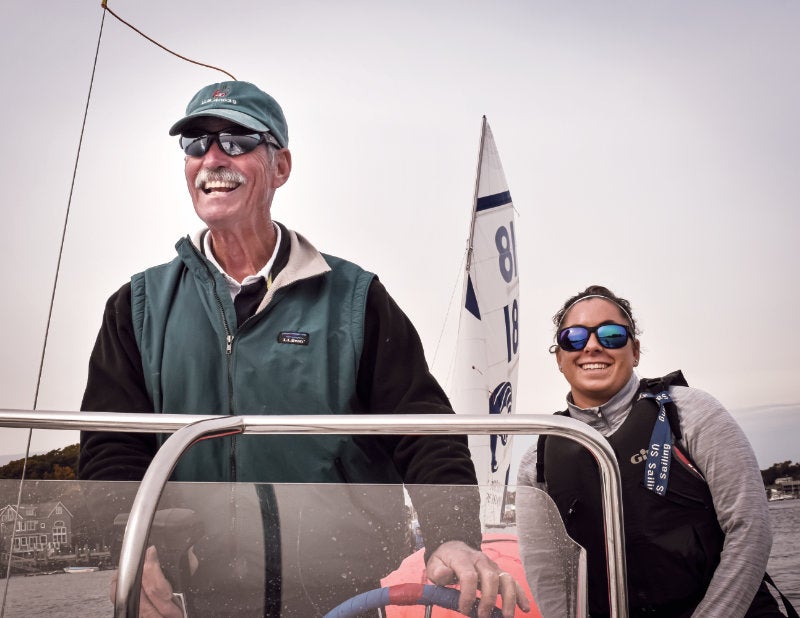
The club started in 1935 with Rhode Island State College engineering professor Edson Schock. After a hiatus during World War II, the team was resurrected in the late 1940s. In 1951, the same year Rhode Island State College became the University of Rhode Island, a group of students built the first sailing center at Marina Park. “Sailing center” is really a misnomer; it was more like a shack that grew into its present iteration as the URI Sailing Pavilion in 1992. But the shack was home to some of URI’s sailing greats, including current coach, David “Moose” McClintock ’77.
McClintock is tall and solid, and steers his motorboat with large, wide hands. “Let’s do it again!” he yells, as students in small dinghies lean their bodies over the edge, booms swinging to the other side. They’re practicing racing starts, and even in the fading sunlight, you can’t miss McClintock’s grin. He’s loving every minute of it.
“I don’t remember when I first started sailing,” says McClintock. “We just did it from the second I was born.”
When he started at URI in 1972, he changed majors just so he could be on the water. “I started as a math major, but realized that all my classes and labs were in the afternoon,” he says. “I changed my majors to English and history so everything was done by 11 a.m. After classes, I’d run back to the dorm, eat lunch, then go straight to the boathouse.”
His teammates went on to have successful sailing careers. “That team was the basis for the team that won the nationals in 1977,” McClintock says. And that was just the start. The club went on to produce All-Americans Ed Adams ’78, Gary Knapp ’79, Lars Guck ’91, and Skip Whyte ’71, who spent 17 years coaching Olympic sailing teams—including a 2004 gold medal win in Greece—then came back to URI to coach the sailing club from 2013–2019.
In 1981, the team officially became a club sport, and in 1990 the keelboat team became the only U.S. team to win the Collegiate Keelboat World Championship, and is still the only URI athletic team to ever win a world title.
And the tradition of excellence hasn’t diminished. For current team captain Chris Pearson ’20, who grew up on the water, sailing at URI was a whole new experience.
“The first day of practice I got my ass kicked. Everyone was really good. It was humbling. When somebody was crushing you, there were no social barriers between you and them; I’d just go up to them and ask how they were beating me so hard,” he laughs. “That’s how you learn on teams like this.”
Men’s Lacrosse: The Professionals

Team president Maxwell Hastings ’20 was pleasantly surprised when he drove by the field on Plains Road on Welcome Day and saw the URI club lacrosse team playing. “I thought, ‘That’s cool. I’ll have to try out for the team,’” he says.
And Hastings threw himself into it. The senior nursing major was part of the program’s revival, and during his tenure the team has grown, garnering an Adidas equipment partnership, more than 1,000 Instagram followers, and most importantly, a conference championship title.
Of leading the team, Hastings says, “The off-field stuff was so much bigger than I expected. I didn’t know what I was getting myself into. It feels like a full-time job, like managing a sports program by yourself. I mean, hiring a coaching staff is something I never thought I would have to navigate.”
“Winning the conference last year was a culmination of everything, of all the on-field and off-field work the guys put in, especially the juniors,” says Hastings. “We didn’t have any seniors last year. It’s such a young program, but they stuck it out, even when we were getting our butts kicked by everyone and no one was supporting us. It’s really good to see this come full circle for us.”
Men’s Hockey: The Coach
Practice is starting. Players dump dozens of pucks onto the ice in Boss Arena. Coaches and players zip around, taking shots, twirling sticks, and skating backwards. This is URI men’s club hockey, and it’s anything but a game.
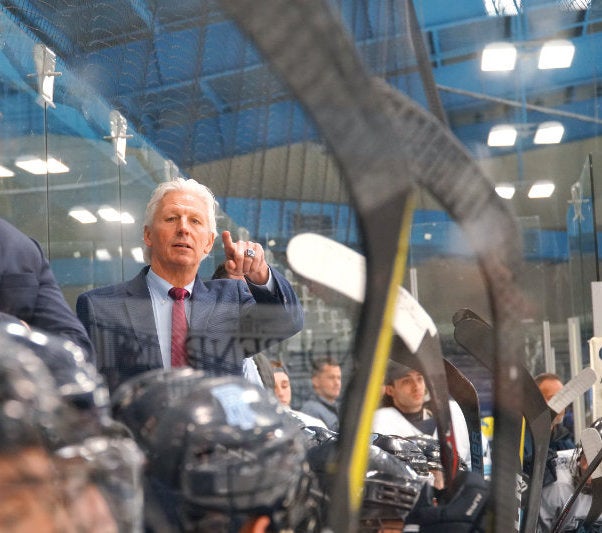
The club traces its history back to 1951, when it was founded by rink namesake Bradford Boss ’55.
Half a century later, at the opening of the arena in 2002, Boss declared, “I invite all Rhode Islanders to lace up their skates, grab a stick and a puck and join the fun because the Kingston Ice Age has begun.”
The man at the helm of URI men’s hockey during this Ice Age has had quite a run.
As today’s practice starts, Coach Joseph Augustine floats onto the ice, silver hair glinting under the bright lights, and unwraps a piece of candy with his teeth and a gloved hand.
Augustine drives an hour-and-a-half round trip from Scituate to Kingston four days a week to run practice. He’s coached more than 1,000 games, run thousands of practices, and led his team to more than 630 wins.
Augustine grew up playing hockey on the ponds around Chicago. “I just played outside like everybody, on ponds, wherever we could find a sheet of ice. I didn’t really play organized hockey until I was 13 or 14. And I kind of went from there.”
“Kind of went from there” means the left-shot defenseman played for Boston College, a slew of professional teams, and then coached at Brown University before coming to URI in 1989.
Christian Rigamonti ’94 is the general manager for the team today, but in 1990, he played at URI under Coach Augustine. “Back then, we practiced in the West Warwick Civic Arena, twenty minutes away,” Rigamonti says. “We didn’t have a rink, we didn’t have locker rooms … it was a lot different.”
The thing that hasn’t changed: Augustine.
“He’s strict and demanding, but at the end of the day, he wants to see everyone get better,” says Rigamonti. “He feels that if you work hard and try your best, you’re going to get better. He wants his hockey program to be successful; the reputation of this program means a lot to him. The people in the program mean a lot to him.”
“When you’re playing,” says Augustine, “you don’t think about it. But when you’re done, you realize it’s been such a big part of your life …” he trails off. “Some guys can walk away from it, but after I finished playing, coaching filled that void.”
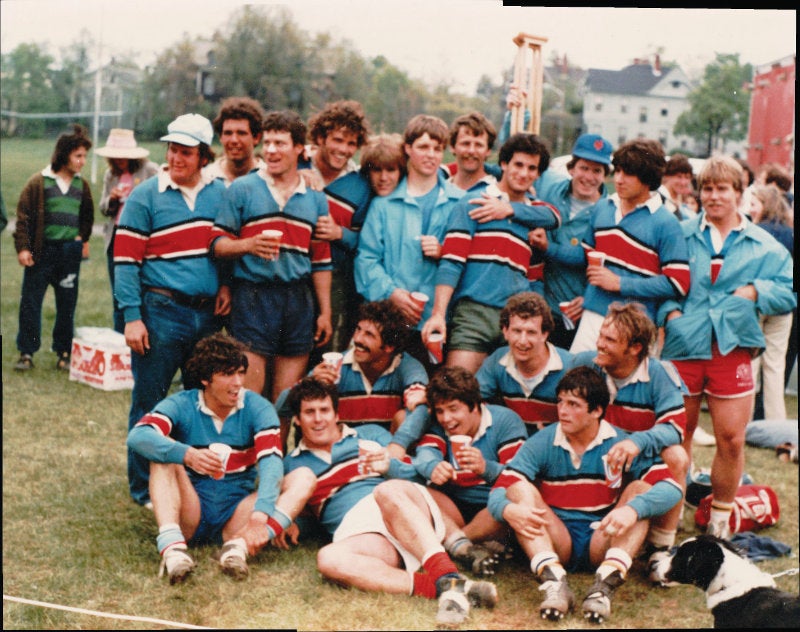
Men’s Rugby: The Biggest Fan
Kevin Cronan ’77 bleeds Keaney blue.
Wearing a URI rugby shirt, he picks through a box filled with mementos: rugby boots, a threadbare rugby shirt with blue stripes, trophies, framed photos of his teammates. Then he opens a scrapbook, turning the pages until a bumper sticker catches his eye.
“It takes leather balls to play rugby,” it says. He blushes and continues flipping through the scrapbook. “I had that bumper sticker on my car for a while, but when I started working at a Catholic school, I decided it was probably best to take it off,” he says.
Cronan is fanatical about URI rugby. He’s spent almost 50 years collecting pieces of team history and has even written a book about playing rugby at URI in the 1970s. Rugby: Tries and Knock Ons (written under pen name Conor Murphy) tells the story of a winning bunch of ruggers—from the free beer at practices to the 1979 New York Sevens Rugby Tournament title win.
Cronan joined the team in 1975, coming from track and field. “I was looking for something to keep me busy during downtime, so I tried this strange game,” he writes. “Some of the students I saw playing rugby had long hair and cut-off jean shorts, but it was the 70s. A few of them did not look very athletic either, so I decided to show up at one of their practices at the end of the season and see how I’d fare against them.”
So began his love affair not only with this “strange sport,” but with a school, a time, and a team.
“Those that played this very physical game for the Rhody rugby team, especially when we were at our best, winning matches and being discussed throughout the New England rugby circuit, will never forget the team and its players’ camaraderie.”
Club volleyball team captain Zach Johnson ’21 keeps the team energy up.
Volleyball: The Champions
Zach Johnson ’21 huddles with his teammates getting pumped for their next match in a tournament the team is hosting on this December morning. Aside from shouts of support from parents and friends, the soundtrack of the day is mainly squeaking shoes and the smack of palm against volleyball.
Volleyball isn’t a sport for the faint of heart: The average speed of the ball during a spike is 82 miles per hour. Not many people would be willing to put themselves in front of a ball going faster than a car on Route 95, but for this team—the first club sport at URI to win a national championship since 2011—it’s what it takes to win.
“The championship was something we were very lucky to accomplish last April,” says Johnson, a marketing major. “It was the first time for the program—and it could be the only time for a while.” He pauses, then adds, “But, obviously we’re competing to win it again this year.”
Johnson is tall and blond with slow, loping movements that accelerate to rapid-fire during matches. He’s been playing volleyball since high school, and as a captain of a championship club team, his biggest challenge is motivating people to take it seriously.
“It’s a club sport, so you’re volunteering your time, and no one is forcing you to do this. But we have to motivate people to get better and we have very, very high-intensity practices,” he says. “There is an expectation that we will come back where we left off.”
Ashley MacGregor ’20 on the uneven bars at the 2019 NAIGC Nationals in Daytona Beach, Florida. Assistant coach Michael Franco is on the right.
Gymnastics: The Comeback Kids
In early 2008, first-year student Erika Sloan Carbone ’11 received an ominous text from the seniors on the then-varsity gymnastics team. The message: Mandatory team meeting, be there. “I remember thinking, ‘Are we in trouble for something? What’s going on?’” says Carbone.
Due to budget trims, URI was cutting its D1 varsity gymnastics program, along with men’s swimming, men’s tennis, and field hockey.
The news was a gut punch. “It was devastating,” says Carbone. “I was a freshman and still had three years ahead of me.” Carbone and teammate Krista Dominici Healey ’10 decided there had to be a way to stay at URI and still do gymnastics. “And that,” says Carbone, “is how the club team started.”
To corral recruits, Carbone and Healey handed out flyers in the cafeteria, messaged girls on Facebook, and spread the news that the gymnastics team wasn’t going anywhere.
“Our first year as a club team we had about 12 girls; we competed the season and went to Nationals, not knowing what to expect. The next year, we recruited back one of our D1 teammates, Lindsay Diamond ’11, and that year—2010—we won NAIGC Nationals,” says Carbone. “It was our redemption.”
Since then, the URI gymnastics club team has established itself. “We are a competitive program,” says the club’s now-president Emma Mangione ’20. “We compete nationally with two teams, and every year at nationals both our teams qualify for finals, two of only six teams in the nation.”
But the team hasn’t forgotten its roots. “Our alumni stood in dining halls and handed out flyers; they went into dorms and asked girls, ‘Hey, did you ever do gymnastics? Do you want to do gymnastics?’” says Mangione. “They built this team from the ground up. We’re very lucky with how we started and how we grew.”
Lilly Margolis at the 2018 Club Nationals.
Swimming and Diving: The Lessons
Lilly Margolis ’19 first dipped her toes into pool water when she was 6 years old.
“My mom coached at the YMCA, so swim became part of my life from a young age,” she says. “She signed me and my sister up for the swim team, and I fell in love.” She swam throughout elementary, middle, and high school and has been coaching for more than eight years.
But she didn’t swim at URI until her junior year, because initially, the club team was only men.
She remembers the moment she found out the team was turning coed, the moment she found out she could finally swim for her school. “I was out celebrating my birthday and one of my friends—the captain of the club swim team—told me, ‘We’re turning coed. You can swim now!’ I got so excited that I called my parents at 1 a.m. and was like, ‘I finally get to swim!’” she says.
The team made it to nationals her senior year, a sweet send-off for Margolis. “My last year, we all really bonded, and then the whole team went to nationals. That was really nice.”
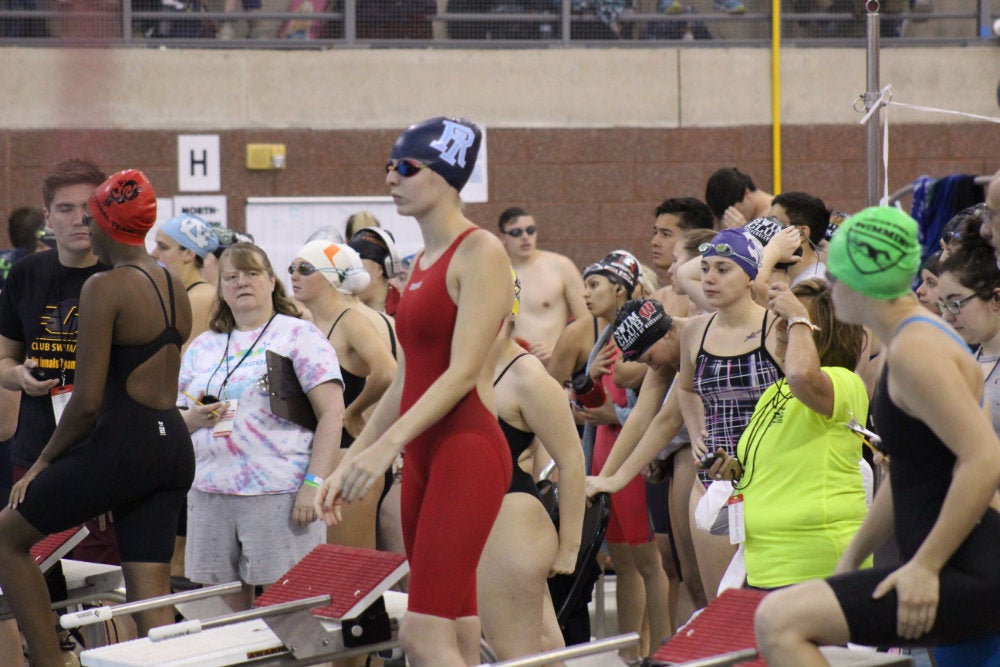
Since graduating, she’s had an injury that’s prevented her from joining a master’s team, but she still coaches and is glad to share the lessons she learned from swim with a new generation of water lovers.
“Swim taught me some great lessons about work ethic and respect. That’s why I like coaching: I get to show the kids why I fell in love with it and teach them what I learned so they can not only become better swimmers, but better people.”
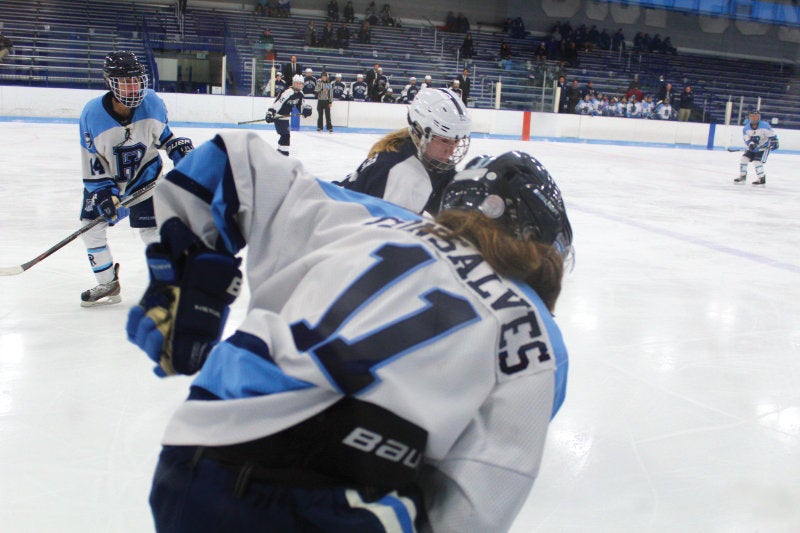
Women’s Hockey: The Tenacious
They were down 5-0 to UMass.
“It was a rough game,” says URI women’s club hockey captain Madison Balutowski ’21. “The coaching staff got a little discouraged.” But instead of resigning themselves to a loss and a post-game locker room chastising, the players rallied. “We came together and acted like we were winning the game. We still lost, but it was the best hockey I’ve played,” says Balutowski.
The URI women’s hockey team is used to fighting the odds. While it has a storied 20-year history—reaching the final four in national championship tournaments nine times and earning 10 conference titles—it has struggled to get out of the shadow cast by the men’s team.
“When people think of hockey, they think of the physicality and body-checking—and that’s something women’s hockey doesn’t include,” says Balutowski. “We’re more skill-oriented, whereas men’s hockey can get rowdy.”
But she’s quick to add that the reason they play a less physical game is out of their hands. “USA Hockey rules limit body-checking in women’s hockey,” she says. “In men’s hockey, they can body-check and open-ice hit; in women’s, you can have contact, but you can’t charge from across the ice and slam someone into the boards.”
What does Balutowski think about this? “They’re looking out for us, but at the same time,” she says, “you look at men’s and women’s rugby and there are no rules differentiating what they can do; it’s kind of a downfall for us; we have the same protective equipment as men’s hockey, but we have different rules.”
In the meantime, they work to spread the word that a more technical game of hockey can be riveting to watch. “The women’s team attends the men’s games, and we see all the students and alumni that come and support them,” she says. “Then we look in the stands at our games and it’s the same four or five families.”
“But we’re finally starting to see some change,” Balutowski says. “We got so excited the other day because we were in the Memorial Union and saw a poster with our home game schedule. As long as club sports keeps pushing for us, that will make a difference.” •
Photos: Grace Kelly; Nora Lewis; Sebastian Pizzuto; Michael Salerno; Courtesy Kevin Cronan; Courtesy Lilly Margolis; Courtesy URI Club Sports
AUTHOR’S NOTE:
When I started this story in September 2019, the world was a different place. Wide-eyed first-year students were trying out for teams, and new coaches were onboarding. Throughout the fall, winter, and early spring, URI’s club teams practiced, fundraised, competed, won, and lost.
Seniors looked forward to leaving their club sports on a high note, some even to championship wins. But the COVID-19 pandemic changed everything.
Schools around the country were shuttered, and URI followed suit. “When the University made the decision to move to online instruction for the remainder of the semester, we had no choice but to cancel all activities,” says Joe Wilbur, coordinator of club sports.
“The seniors were hit hard,” says senior lacrosse player Maxwell Hastings. “We were all texting about how sad it was we would never have our senior night or get another chance to put the jersey on. We didn’t even have a last practice together—or a last game, or even an end-of-year meeting.” Hastings leaves a team that worked hard to rise in national rankings, coming in 15th in the nation with, he notes, serious aspirations of competing for the national title.
“We had just returned from Nashville where we had a great showing against some of the nation’s top teams. Our last game of the season was against the number-two team—we ended up losing by one goal in the last 30 seconds of the game,” he says. “This group had a real shot at the national title, and we were just starting to hit the stride of our season.”
“It’s been really tough,” says senior gymnast Emma Mangione, her voice breaking. “It’s been kind of hard to grasp and come to terms with. I started gymnastics when I was two years old. So, on top of finding out that my team isn’t going to be able to compete anymore, all of a sudden I’m done with what’s been the biggest part of my life, for my whole life.”
But while the pain of a season ended early is still raw, she is grateful for her time at URI and on the team. “A lot of gymnasts don’t go to a college where they have a club team, where they can keep competing,” she says. “So, I think just knowing that our program gave me the opportunity to continue doing what I love for three and a half years. I’m so lucky to have had that.”
–Grace Kelly
Web Extras
Tennis: The Leaders
“We don’t have a coach but we have a board of officers—there are seven of us, I’m the vice president. We take on the role of helping players improve. Pointing out things your peers can improve on can be difficult. But I think not having a coach really allows people to develop into leaders on the team.”
—Jack Leary ’20, education major
Field Hockey: The Co-Eds
“We always joke that field hockey is midway between soccer and hockey. But I think the aspect I like the most is the teamwork. I also gained a lot of leadership and independence through playing field hockey.”
—Kelsey Gulla ’20, nursing major
Women’s Lacrosse: Family and Friends
“It’s pretty close-knit. All of us older girls are mentoring the younger ones and showing them the ropes, so it’s like a huge family. I live with lacrosse girls, so we end up making lifelong friends through this team. which is amazing.”
—Emily Davison, Pharm.D. ’21
Women’s Ultimate: The Fun Sport
“This is my eighth year playing Ultimate Frisbee. I played all through high school, which is unusual. It’s exciting playing at URI because a lot of the students who join our team have no idea what the sport is, and they’re just trying something new, which is awesome.”
—Kait Thibault ’21, elementary education major
Women’s Rugby: The Struggle
It’s twilight, and a group of girls wearing light blue T-shirts gathers in Independence Square.
“How’s everyone feeling?”asks co-captain Madeline Conley ’20.
A player mumbles: “Like an eighty-year-old woman.” Everyone snickers.
Being on the women’s rugby team is tough, but not just physically. Like all club sports, the team is student-run, and this season was especially hard since it started without a coach.
The group is a few minutes into watching a reel of their game against UMass Amherst when a petite woman enters the room and apologizes for being late. Veronique “Vero” Oldham is a new assistant professor of oceanography and has volunteered to help coach the team.
“I played in high school in Canada,” she says. “Most high schools there have girls’ teams and there are city leagues.” Oldham continued playing in college. Now she’s helping a URI women’s team that is struggling not only to get a coach, but also to get recruits.
“We face a lot of stereotypes,” says captain Abagayle Hilton ’20, as she massages her elbow, which is wrapped in a black compression sleeve. “Everybody thinks of it as a ‘gay’ sport, and that it’s too brutal. It’s hard to break those stereotypes. We’re open to anyone joining the team, and it’s hard to convey that it’s not as scary as it sounds and looks.”
“I knew about rugby because my cousin played. I’d seen a few games and thought it looked pretty cool,” says Hilton. “So on my first night at URI as a freshman, I went to check it out. I saw them literally lifting someone in the air for a lineout, and I was like, ‘Oh man, that’s too cool!’”
“I have friends who are like, ‘You guys kill each other!’” says Hilton, “and I’m like, ‘No, we help each other up.’”
Men’s Wrestling: The Rebound
“The 1972–73 wrestling season had the URI grapplers vaulting themselves onto the scene as a New England and Eastern power to be reckoned with,” says Athletic Endeavors, a booklet highlighting the 1972–73 year of sports at URI. “The Ram wrestlers were a hardworking, dedicated, close-knit group. With virtually the entire squad back, the Rams should continue to be a power.”
But as the years went by and funds were lost, this power proved hard to sustain off the mat.
“Since then, I think it’s been scattered between being a team and not being a team,” says Eli Goldfarb ’21, and current wrestling club president. Even now, with a team of around 20 students, Goldfarb admits it’s been a struggle. “The president before me was trying very hard and didn’t have a lot of help. Now we’re doing alright, but I had a lot of help. I give him a lot of credit, because we all really care about this team and growing the sport.”
Men’s Ultimate: The Real Sport
When you think of competitive sports, you might not think of Frisbee.
“A lot of people say it’s not a real sport,” says URI men’s Ultimate captain Matt Pitman, ’21. “But it’s a lot of running. Plus, I don’t think people realize how many people actually play and that practically every college has a team.”
Pitman, a computer and data science major, started hucking Frisbees after a shoulder dislocation ended his high school baseball career. The sportsmanship and camaraderie of Ultimate hooked him. “The atmosphere is relaxed, and everybody is there to have a good time. There are no referees, just the spirit of the game, and everybody has a good attitude.”
But that’s not to say he wasn’t intimidated during tryouts. “I wasn’t expecting to make the A-team. I’d never seen a college Ultimate team and I thought, ‘Oh, these kids are all in college, they’re all so good,” he says. “But then, as I started playing, I thought maybe I had a chance here. Everyone was so welcoming. I realized I could fit in and that maybe I belong more than I thought.”

URI crew has had national championship boats in 2016 (2), 2017(2), 2018 (1). Please fact check your volleyball article where It is quoted “they have the first national championship for URI since 2011”
Hi Joe,
I asked Club Sports and Campus Recreation staff to reply to your comment. Here’s what they said:
Men’s volleyball is the only club sport to win a full-team national championship since 2011 but the club crew team has brought home several gold medals for individual boats at the ACRA national championships in recent years.
2016 (2)
American Collegiate Rowing Association Championships May 28 & 29 in Gainesville, Ga – Finals:
Men’s Novice 4+ A Final
Place: 1st
Entry: Rhode Island
Time: 6:47.840
Men’s Ltwt Varsity 4+ A Final
Place: 1st
Entry: Rhode Island
Time: 6:44.477
2017 (2)
American Collegiate Rowing Association’s Championships Regatta: May 27 & 28, 2017 Finals:
Men’s Ltwt Novice 4+ A Final
Place: 1st
Entry: Rhode Island
Time: 7:20.992
Men’s Ltwt Varsity 4+ A Final
Place: 1st
Entry: Rhode Island
Time: 7:25.158
2018 (1)
American Collegiate Rowing Association’s Regatta: May 26 & 27, 2018 Finals:
Men’s Novice 4+ A Final
Place: 1st
Entry: Rhode Island
Time: 6:59.981
Men’s Small Boats Trophy Place Club Points:
1st Michigan 243
2nd Rhode Island 181
3rd George Mason 148